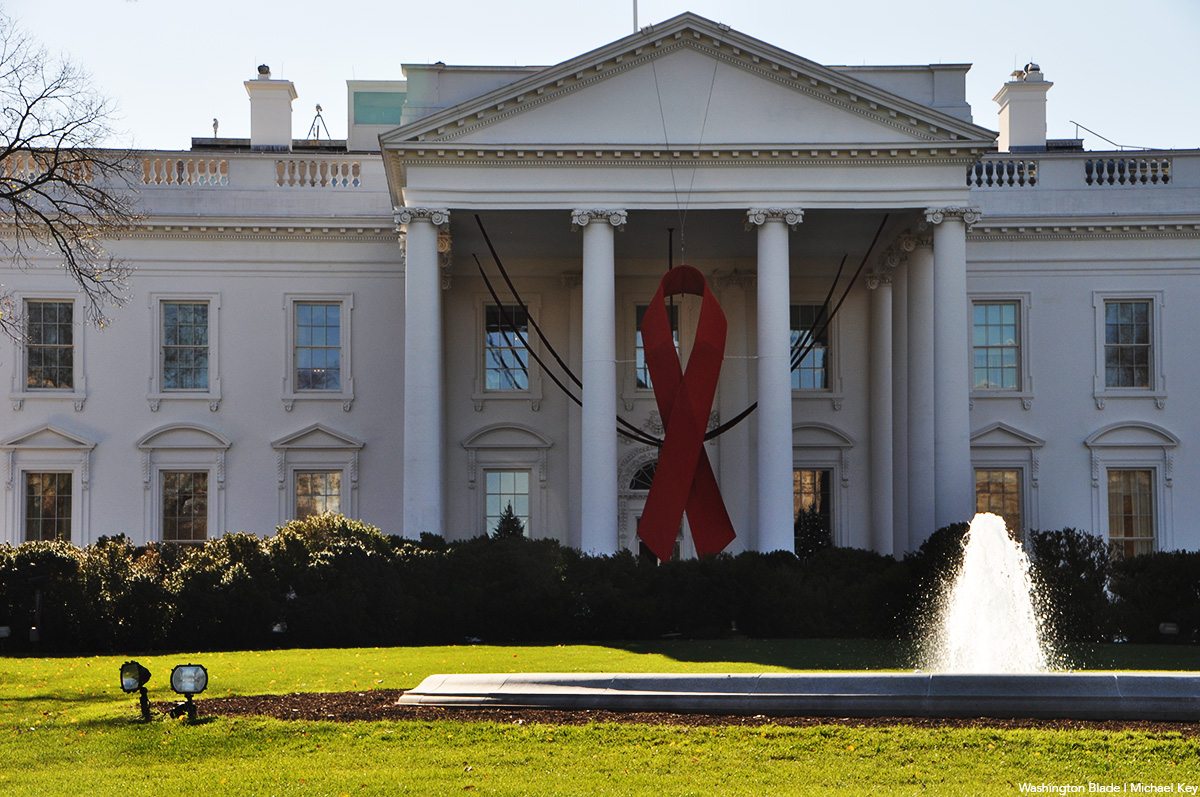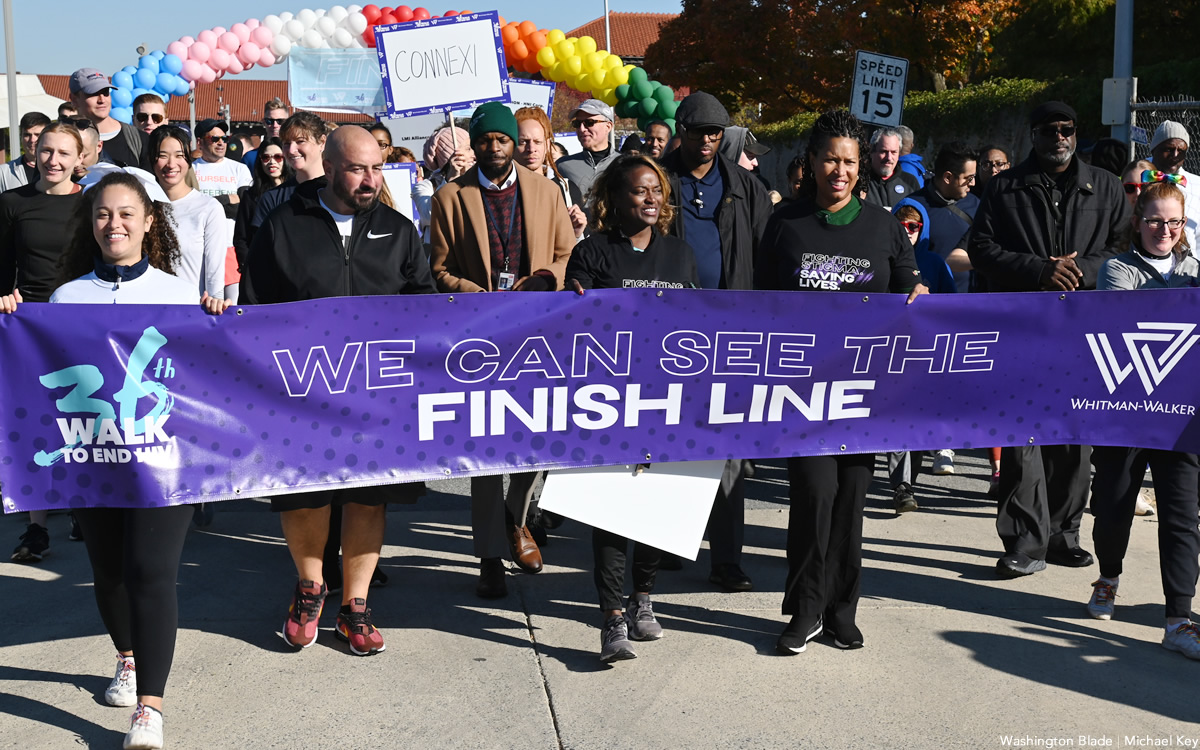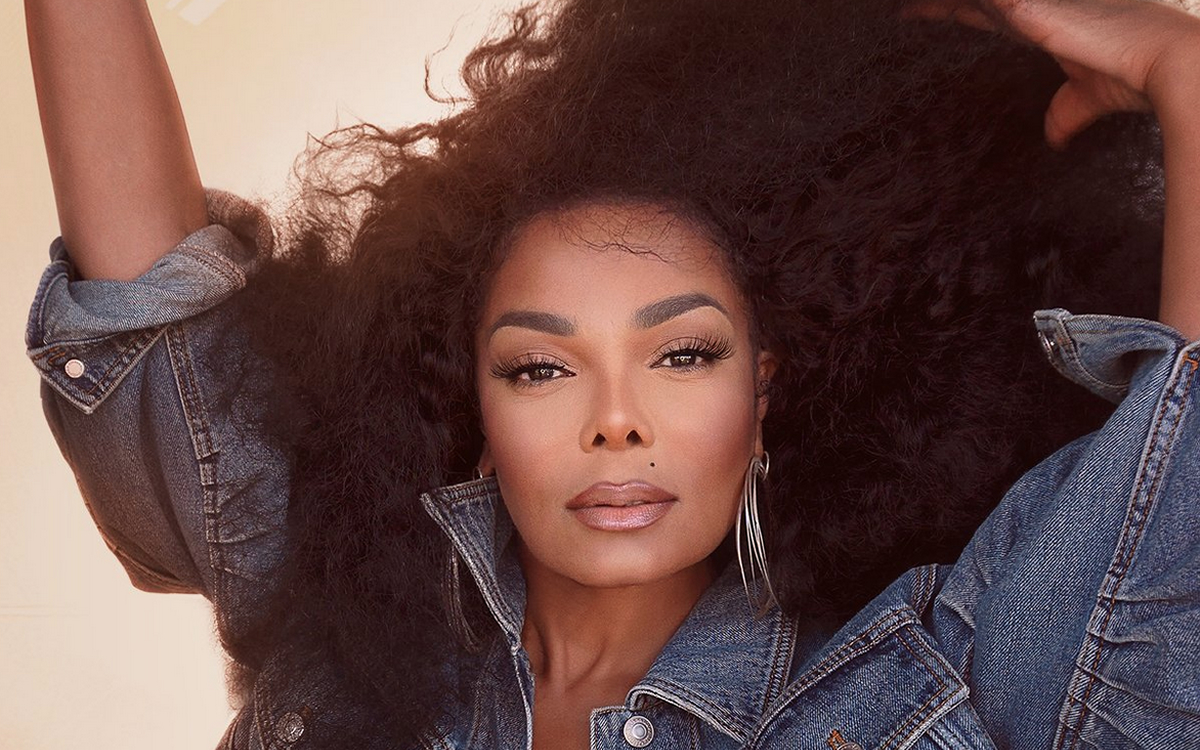National
Local, national events to mark 35th annual World AIDS Day
Advocates say stigma remains key obstacle to ending the epidemic

UNAIDS dubbed this year’s World AIDS Day theme as “Let Communities Lead.” This is how conversations around HIV and AIDS should be structured, Duante’ Brown said, who manages two programs at NMAC — a nonprofit dedicated to working to end the AIDS epidemic. People living with HIV need to be considered the subject matter experts, he said.
“Bringing those people into the room, showing them that they have a voice and that there’s not just this group of people who are making a decision for them … is definitely the way that you go about this.”
Brown manages the ESCALATE program at NMAC, which aims to empower people to address HIV stigma, and the ELEVATE program, which is a training program for people with HIV to be more involved in the planning and delivery of the Ryan White HIV/AIDS Program, which is the largest federal program designed specifically for people with HIV.
In the United States, it’s estimated 1.2 million people are living with HIV, according to HIV.gov. About 13% are unaware they have HIV.
HIV also continues to disproportionately affect certain populations. Men who have sex with men accounted for 70% of the 32,100 estimated new HIV infections in 2021. And Black individuals accounted for 40% of the new infections that year, while only comprising 12% of the population of the United States, according to the CDC.
In 2023, stigma is a key inhibitor to ending the epidemic, Brown said. When stigma gets out of the way, there could be a day when there are no new cases of HIV transmissions, he said. To get around that stigma, people need to have meaningful and productive conversations about AIDS.
“Not treating it as taboo, making sure that we are empowering people living with HIV and AIDS to tell their stories and to be empowered to feel that it’s OK,” Brown said. “And that nothing is wrong with you.”
And there are several events in the region to recognize World AIDS Day, many of them aimed at abolishing the stigma that comes with talking about HIV.
World AIDS Day events

Whitman-Walker is hosting two events around World AIDS Day this year. There is the World AIDS Day Cabaret on Dec. 1, which is a 70-minute performance of “The Shadow of Her Smile” by Ann Talman. Talman starred alongside Elizabeth Taylor, a legendary AIDS advocate, on Broadway and locally at the Kennedy Center.
The show highlights Taylor’s advocacy for those with AIDS. She established the Elizabeth Taylor AIDS Foundation in 1991 to raise funds and awareness to fight the spread.
The show will be at The Corner at Whitman-Walker. Doors open at 7 p.m., and the $50 admission includes a complimentary cocktail.
Whitman-Walker is also hosting its Annual Walk to End HIV on Dec. 2. The 37th annual walk will begin at Anacostia Riverwalk Trail. This year, the walk celebrates the new Whitman-Walker location in Anacostia Park – the Max Robinson Center.
“We’re continuing this new tradition of hosting the walk east of the river as a way to really remind the community that there is a pillar of support care and resources to a very historically undervalued and underserved portion of Washington, D.C.,” said Dwight Venson, the external affairs and community coordinator at Whitman-Walker.
The warm-up begins at 8:45 a.m., and the walk kicks off at 9 a.m. Venson noted there is no need or pressure to fundraise — the goal is for people to come out and march.
More details on both events are available on Whitman-Walker’s website. The organization also provides HIV testing across D.C., and more details are available on its website.
At a national level, Janet Jackson is set to headline the World AIDS Day concert on Dec. 1 — an annual fundraiser sponsored by the AIDS Healthcare Foundation. The concert will be at the NRG Arena in Houston, and will also honor actor and activist Blair Underwood with its lifetime achievement award.
“[The concert] really is a way to commemorate World AIDS Day in a way that is both remembrance of those that we’ve lost, recognizing where we’re at, but also really celebrating and connecting the work that’s yet to be done. And having folks still leaving uplifted and elevated about what the future could hold,” said Imara Canady, AHF’s national director for communications and community engagement.
Jackson has long been an outspoken advocate for people living with HIV. Her song, “Together Again,” is a tribute to a friend she lost to AIDS, as well as a dedication to patients around the world.

The AIDS Healthcare Foundation, the largest nonprofit HIV/AIDS service organization and advocacy group, has several health care centers in D.C., Maryland and Virginia, and many across the nation and world.
Mike McVicker-Weaver, the regional director for the D.C. and Baltimore area for AHF, said the local region has a robust network of providers to address HIV in the area, which is something to be proud of.
“I see a lot of collective effort on strategizing, to bring an end to the epidemic,” McVicker-Weaver said.
AHF also has a free HIV test locater online at freehivtest.net.
CAMP Rehoboth is hosting a World AIDS Day non-denominational service on Dec. 1. Attendees will walk from CAMP Rehoboth to All Saints’ Church on Olive Avenue at 5:30 p.m., and the service will begin at 6 p.m.
The service will feature the names of local people who have died of AIDS, and there will be performances by members of the CAMP Rehoboth Chorus. Attendees can also create a painted rock expressing their feelings about AIDS, loss and hope, which can be placed at the Peace Pole on CAMP Rehoboth grounds.
There will be a display of a portion of the AIDS Quilt for viewing at All Saints’ Church. There are also viewing opportunities on Dec. 2 and Dec. 3. More details about the service are available on CAMP Rehoboth’s website.
CAMP Rehoboth recently expanded its HIV testing program, CAMPsafe, to offer daily free testing.
“It’s our work here to commit to making a better future where those cases are less,” said Matty Brown, the communications manager at CAMP Rehoboth. “We just want to make sure that there’s ample room for plenty of testing opportunities.”
Visual AIDS, an organization using art to raise AIDS awareness, is hosting a screening of five videos about connections between HIV and other forms of illness and disability. “Everyone I Know Is Sick” is on Dec. 1 at 6 p.m., and more details are available on Eventbrite.
D.C. Health is hosting a World AIDS Day Celebration on Nov. 30. There will be live performances, and the event is free. More details are available on Eventbrite.
The DC Alumnae Chapter of Delta Sigma Theta is organizing a celebration and community HIV screening on Dec. 1 at Skyland Town Center. It’s an outdoor event, and attendees are encouraged to bring a chair and dress comfortably. More details are available on Eventbrite.
Daydream Sunshine Initiative is hosting an event with free screenings and a clothing closet in Mount Rainier, Md., on Dec. 1. More details are available on Eventbrite.
There is a World AIDS Day community celebration on Dec. 1 at Johns Hopkins, hosted by the nonprofit Begin Anew. The Baltimore city mayor and Savena Mushinge, Miss Maryland USA 2023, are expected to speak. More details are available on Eventbrite.
Montgomery County is hosting its third annual World AIDS Day Solidarity for Health Equity Breakfast at the Silver Spring Civic Building on Dec. 1. It will highlight HIV’s disproportionate impact on Black women in the county. More details are available on the Montgomery County government’s website.
Federal Government
UPenn erases Lia Thomas’s records as part of settlement with White House
University agreed to ban trans women from women’s sports teams

In a settlement with the Trump-Vance administration announced on Tuesday, the University of Pennsylvania will ban transgender athletes from competing and erase swimming records set by transgender former student Lia Thomas.
The U.S. Department of Education’s Office for Civil Rights found the university in violation of Title IX, the federal rights law barring sex based discrimination in educational institutions, by “permitting males to compete in women’s intercollegiate athletics and to occupy women-only intimate facilities.”
The statement issued by University of Pennsylvania President J. Larry Jameson highlighted how the law’s interpretation was changed substantially under President Donald Trump’s second term.
“The Department of Education OCR investigated the participation of one transgender athlete on the women’s swimming team three years ago, during the 2021-2022 swim season,” he wrote. “At that time, Penn was in compliance with NCAA eligibility rules and Title IX as then interpreted.”
Jameson continued, “Penn has always followed — and continues to follow — Title IX and the applicable policy of the NCAA regarding transgender athletes. NCAA eligibility rules changed in February 2025 with Executive Orders 14168 and 14201 and Penn will continue to adhere to these new rules.”
Writing that “we acknowledge that some student-athletes were disadvantaged by these rules” in place while Thomas was allowed to compete, the university president added, “We recognize this and will apologize to those who experienced a competitive disadvantage or experienced anxiety because of the policies in effect at the time.”
“Today’s resolution agreement with UPenn is yet another example of the Trump effect in action,” Education Secretary Linda McMahon said in a statement. “Thanks to the leadership of President Trump, UPenn has agreed both to apologize for its past Title IX violations and to ensure that women’s sports are protected at the university for future generations of female athletes.”
Under former President Joe Biden, the department’s Office of Civil Rights sought to protect against anti-LGBTQ discrimination in education, bringing investigations and enforcement actions in cases where school officials might, for example, require trans students to use restrooms and facilities consistent with their birth sex or fail to respond to peer harassment over their gender identity.
Much of the legal reasoning behind the Biden-Harris administration’s positions extended from the 2020 U.S. Supreme Court case Bostock v. Clayton County, which found that sex-based discrimination includes that which is based on sexual orientation or gender identity under Title VII rules covering employment practices.
The Trump-Vance administration last week put the state of California on notice that its trans athlete policies were, or once were, in violation of Title IX, which comes amid the ongoing battle with Maine over the same issue.
New York
Two teens shot steps from Stonewall Inn after NYC Pride parade
One of the victims remains in critical condition

On Sunday night, following the annual NYC Pride March, two girls were shot in Sheridan Square, feet away from the historic Stonewall Inn.
According to an NYPD report, the two girls, aged 16 and 17, were shot around 10:15 p.m. as Pride festivities began to wind down. The 16-year-old was struck in the head and, according to police sources, is said to be in critical condition, while the 17-year-old was said to be in stable condition.
The Washington Blade confirmed with the NYPD the details from the police reports and learned no arrests had been made as of noon Monday.
The shooting took place in the Greenwich Village neighborhood of Manhattan, mere feet away from the most famous gay bar in the city — if not the world — the Stonewall Inn. Earlier that day, hundreds of thousands of people marched down Christopher Street to celebrate 55 years of LGBTQ people standing up for their rights.
In June 1969, after police raided the Stonewall Inn, members of the LGBTQ community pushed back, sparking what became known as the Stonewall riots. Over the course of two days, LGBTQ New Yorkers protested the discriminatory policing of queer spaces across the city and mobilized to speak out — and throw bottles if need be — at officers attempting to suppress their existence.
The following year, LGBTQ people returned to the Stonewall Inn and marched through the same streets where queer New Yorkers had been arrested, marking the first “Gay Pride March” in history and declaring that LGBTQ people were not going anywhere.
New York State Assemblywoman Deborah Glick, whose district includes Greenwich Village, took to social media to comment on the shooting.
“After decades of peaceful Pride celebrations — this year gun fire and two people shot near the Stonewall Inn is a reminder that gun violence is everywhere,” the lesbian lawmaker said on X. “Guns are a problem despite the NRA BS.”
New York
Zohran Mamdani participates in NYC Pride parade
Mayoral candidate has detailed LGBTQ rights platform

Zohran Mamdani, the candidate for mayor of New York City who pulled a surprise victory in the primary contest last week, walked in the city’s Pride parade on Sunday.
The Democratic Socialist and New York State Assembly member published photos on social media with New York Attorney General Letitia James, telling followers it was “a joy to march in NYC Pride with the people’s champ” and to “see so many friends on this gorgeous day.”
“Happy Pride NYC,” he wrote, adding a rainbow emoji.
Mamdani’s platform includes a detailed plan for LGBTQ people who “across the United States are facing an increasingly hostile political environment.”
His campaign website explains: “New York City must be a refuge for LGBTQIA+ people, but private institutions in our own city have already started capitulating to Trump’s assault on trans rights.
“Meanwhile, the cost of living crisis confronting working class people across the city hits the LGBTQIA+ community particularly hard, with higher rates of unemployment and homelessness than the rest of the city.”
“The Mamdani administration will protect LGBTQIA+ New Yorkers by expanding and protecting gender-affirming care citywide, making NYC an LGBTQIA+ sanctuary city, and creating the Office of LGBTQIA+ Affairs.”
-

 U.S. Supreme Court4 days ago
U.S. Supreme Court4 days agoSupreme Court upholds ACA rule that makes PrEP, other preventative care free
-

 U.S. Supreme Court4 days ago
U.S. Supreme Court4 days agoSupreme Court rules parents must have option to opt children out of LGBTQ-specific lessons
-

 Television5 days ago
Television5 days ago‘White Lotus,’ ‘Severance,’ ‘Andor’ lead Dorian TV Awards noms
-

 Music & Concerts5 days ago
Music & Concerts5 days agoBerkshire Choral to commemorate Matthew Shepard’s life











